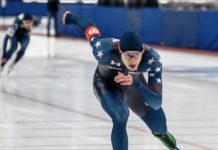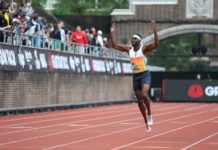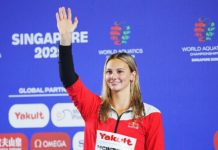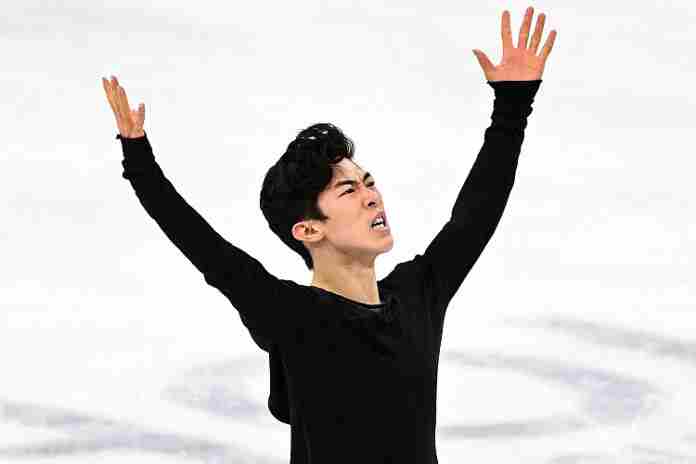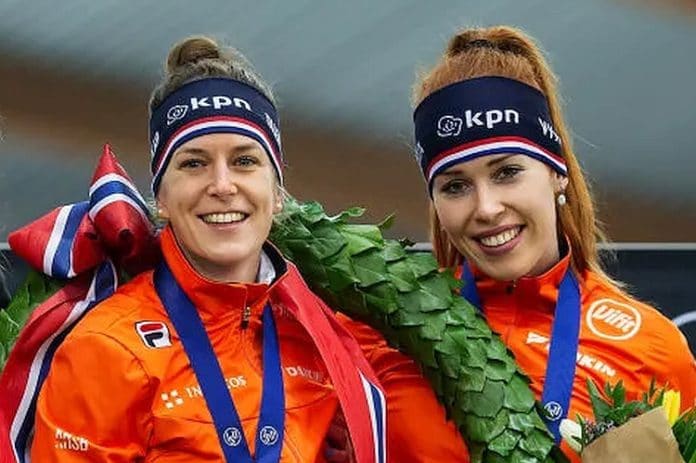(★ Friends: So thankful for your donations, which already cover 26% of our site costs for services for the first six months of 2022. If you would like to help, please donate here. Your confirmation of support is our motivation. ★)
= BEIJING 2022 =
From Lane One
“We said we were putting in place three layers of testing to make sure the Games were safe: pre-departure, airport and inside the closed loop, and that we expected the positivity rate to be higher at pre-departure, lower at the airport and lower still in the closed loop, and that the positivity in the closed loop would after people have been here for 3-5 days.
“And that is what we are now seeing.
“The number of cases inside the closed loop is going down, and the number of cases at the airport is zero at the moment. So we’re seeing it evolve as we expected it to do.”
That’s Dr. Brian McCloskey (GBR), the head of the Medical Expert Panel overseeing the Covid countermeasures in coordination with the Beijing organizers during a Tuesday news conference.
McCloskey noted that there is no sign of infections spreading within the closed loop, or infections spreading outside the loop. Further, more people are coming out of isolation than going into isolation, with the average length of stay in isolation just less than seven days. Those with prior infections are coming out in about four days.
That doesn’t mean that there aren’t hard cases, such as those with prior infections who get Covid again (the Omicron variant, for example); new infections are treated strictly according to the protocol. Some 32 athletes are currently in isolation, with 50 already discharged. Said McCloskey:
“The vast, vast majority of the people who are positive are perfectly well: they have no symptoms, they’re not under any treatment. So the decision on when they leave is about when we can judge that they are not infectious to other people and they don’t pose a risk to athletes, participants and the population.”
McCloskey noted that the system reporting to tell athletes their status has not always worked perfectly – or fast enough – but is generally working well. Poland’s Natalia Maliszewska missed the women’s Short Track 500 m, in which she was a medal contender, after receiving conflicting positive and negative tests, which she called a “horror story” of moving between isolation and her delegation quarters in the Olympic Village.
Chun Huang, the Beijing 2022 Covid supervisor, explained that asymptomatic patients are held in isolation facilities – there are 10 spread among the three competition areas – while those showing symptoms are treated in designated hospitals. He noted (as interpreted from the original Chinese):
“We did have some complaints [about the isolation facilities], and we responded to their concerns [in a timely way]; … from the feedback we received so far, things have been improved markedly, but we cannot feel complacent.”
In specific, food is now delivered to these facilities from the Villages, so the same quality is maintained for those in isolation, and more training facilities have been added.
McCloskey emphasized: “Isolation is not good for anybody. We know around the world that the isolation that has been caused by Covid may turn out to be one of the long-lasting damages that Covid has caused to people around the world.
“I took part in a call on Sunday arranged by the Athletes’ Commission, with athletes who were in isolation and I understand the frustration, the stress, the disappointment that they feel after all the preparations, and it is not a good place to be, but we are trying to improve that for them and that’s why we developed the protocol to allow as many people out of isolation as possible.
“The reality is, however, that I can’t make the pandemic go away for the duration of the Games. The pandemic is real, and the risk is real. So we have to manage the risk. So we have protocols to allow as many people as possible out of isolation to train and compete as we can, but only as many as we can do safely and not take other athletes, other participants or the Chinese population at risk.”
There was more information available about the small number of spectators allowed in the venues. They have volunteered to come to the Games, mostly from outside the closed loop. They enter a specific gate, have designated seats – no moving around – and a defined pathway out of the venue. And then they have to take two Covid tests over the next week to be sure they are not infected, but are allowed to go to work during that time.
¶
The Olympic Covid incidence report for 7 February was very good news, with no airport positives at all for either athletes and team officials, or other stakeholders, among 133 arrivals.
Inside the closed loop, there were just five athlete and team officials positives and one positive among the other stakeholders; the combined total of six is the best yet since the main arrivals began on 23 January.
All told, there have been 159 total positives (arrivals and inside the closed loop) among athletes and team officials and 306 among all other stakeholders since the closed loop began operations on 4 January.
The U.S. Olympic & Paralympic Committee reported Tuesday one new case among the 564 delegates in Beijing; we can assume that was figure skater Vincent Zhou, who self-reported his positive. The number currently isolated is now five, with two athletes.
¶
NBC reported a slight increase in its total audience for Sunday’s primetime program, based on preliminary data, moving from 13.6 million on Saturday to 13.7 million, its best night so far.
So far, NBC had preliminary data on total audiences of 8.0 million on Thursday, just 12.8 million for the Opening Ceremony prime-time program on Friday and now over 13 million on each weekend night.
For PyeongChang in 2018, NBC averaged 19.8 million total audience for its primetime programs across the entire Games. Final data is expected to be reported starting Tuesday.
¶
Tuesday had 10 events, reportedly the most ever in a single day of the Winter Games, and with 31 of 109 events contested, Russia continues to lead with 10 medals (2-3-5), trailed by Norway with eight (3-1-4).
Three countries have seven: Netherlands (3-3-1), Italy (2-4-1) and Austria (2-3-2). The U.S. has five medals: 0-4-1, tied for eighth.
For a better comparison of team strength, here are our TSX scoring rankings, using the top eight places, via the time-honored U.S. scoring of 10-8-6-5-4-3-2-1. So after 31 of 109 events:
1. 110, Russia
2. 109, Norway
3. 93, Austria
4. 85, Netherlands
5. 82, Canada
6. 80, Germany
7. 77, Italy
8. 75, United States
9. 72, Sweden
10. 62, China
¶
The superb Olympic statistician Bill Mallon (USA), a founder of the Olympedia statistics site, notes that Dutch star Ireen Wust’s speed skating victories in individual events across five consecutive Games should be considered in the context of those who have won golds at six Games.
He explained that three Olympians have won gold medals at six Olympic Games, but all with one or more partners:
● Birgit Fischer-Schmidt (GER: canoeing)
● Isabell Werth (GER: equestrian/dressage)
● Aladar Gerevich (HUN: fencing)
¶
American skier Nina O’Brien crashed out of the second run of the women’s Giant Slalom and had to be taken to a hospital for added care. USA Ski & Snowboard “announced O’Brien sustained a compound fracture of her left tibia and fibula just short of the finish. She was transported to the hospital in Yanqing where an initial stabilization procedure was successfully performed by local doctors, and she received excellent care. She will return to the US for further evaluation and care.”
¶
The Women’s Tennis Association continued to express its concern over the status of Chinese tennis star Peng Shuai, with a Monday statement from chief executive Steve Simon (USA):
“It’s always good to see Peng Shuai, whether in an interview or attending the Olympic Games.
“However, her recent in-person interview does not alleviate any of our concerns about her initial post from November 2nd. To reiterate our view, Peng took a bold step in publicly coming forth with the accusation that she was sexually assaulted by a senior Chinese government leader. As we would do with any of our players globally, we have called for a formal investigation into the allegations by the appropriate authorities and an opportunity for the WTA to meet with Peng – privately – to discuss her situation.
“We continue to hold firm on our position and our thoughts remain with Peng Shuai.”
¶
A referendum is to be held this summer to approve a bid for the 2030 Olympic Winter Games by the Pyrenees region and Barcelona in Spain and the politicking has begun.
Ricard Font, the Secretary General of the Department of the Vice-Presidency in Catalonia told Radio Catalunya in a 5 February interview that a Winter Games in the area could create a surplus of as much as €1.1 billion ($1.14 billion U.S.) and create long-term interest in the area as a winter-sports capital.
Others are just as sure the idea is a loser on environmental grounds, but the issue will be decided at the polls. In any case, a joint bid from Spain is well behind the bids readied by Sapporo (JPN) and Salt Lake City in the U.S., with Vancouver – the 2010 host – also interested.
~ Rich Perelman
= RESULTS: TUESDAY, 8 FEBRUARY =
● Alpine Skiing: Men’s Super-G
No surprise that Austria and Norway were on the podium, just as in PyeongChang, when Matthais Mayer won and Kjetil Jansrud took the bronze. It was the third spot that was the shocker.
In Beijing, Mayer – starting 12th – was looking up at another Norwegian star, Aleksander Aamodt Kilde, who started seventh and put down a strong run at 1:20.36, with teammate Adrian Sejersted in second place at 1:20.68. Fellow Austrian star Marco Odermatt had already failed to finish.
No problem. Mayer raced down the mountain with excellent speed and control and flashed across the line in 1:19.94, a time that looked like it might not be surpassed. It wasn’t and Mayer earned a second straight gold in the event, done once before by Kjetil Andre Aamodt in 2002 and 2006.
But right after Mayer came American Ryan Cochran-Siegle, 29, with two World Cup medals in his career, both in December of 2020, including a Super-G win. When he’s right, he can make music and he did on Tuesday. His run was strong and he pushed hard in the middle of the race to make up time and finished in a stunning 1:19.98 for the silver medal!
Stuff like this happens in the Olympics, right? Cochran-Siegle joined the pantheon of American Olympic medalists in this event, including Tommy Moe in 1994 (silver), Bode Miller and Andrew Weibrecht and in 2010 (silver-bronze) and Weibrecht and Miller (silver-bronze) in 2014. And, of course, mother Barbara Cochran was the 1972 Olympic gold medalist in the Slalom in Sapporo.
Actually, it was only when Downhill winner Beat Feuz (SUI) did not finish from the 15th position that Mayer, Cochran-Siegle and Kilde started to feel secure. Jansrud, the winner in Sochi and third in 2018, finished 23rd.
The other U.S. finishers included Travis Ganong in 12th, River Radamus in 15th and Bryce Bennett in 17th.
● Biathlon: Men’s 20 km
Who is Anton Smolski?
The 25-year-old from Belarus placed 29th in the 2021 World Championships and has not been heard from on the World Cup circuit this season.
But on Tuesday, he was leading the Olympic 20 km race after four of the five loops of the Zhangjiakou National Biathlon Center, being chased by French star Quentin Fillon Maillet, the overall World Cup leader.
The Cinderella story didn’t have a miracle ending, but a happy one, as Smolski faded a bit on the final loop to finish with a silver medal, as Fillon Maillet charged home to win by 48:47.2 to 49:02.2. Smolski shot clean – crucial for a breakthrough – while Fillon Maillet missed two shots on the early loops but was clean on the last two to get the gold medal.
It’s the second time in three Games with a French winner after the iconic Martin Fourcade won in 2014, and the second medal ever for Belarus in this event, after a co-silver for Sergey Novikov in 2010.
Behind the top two was a two-man race for the bronze, with Norwegian star Johannes Thingnes Boe recording the fastest final loop in the field to pass Russia’s Maxim Tsvetkov and take third, 49:18.5-49:22.3.
The top American finishers were Jake Brown in 28th and Paul Schommer in 35th; Sean Doherty was 42nd.
● Cross Country Skiing: Men’s Freestyle Sprint ~ Women’s Freestyle Sprint
The one-lap, 1.46 km men’s race was a rout for defending champion Johannes Hoesflot Klaebo of Norway, who won by a whopping 26 seconds over defending silver medalist Federico Pellegrino of Italy, with Klaebo timed in 2:58.06.
The two had been in a photo finish in the first semifinal, with Pellegrino winning by 0.06 in 2:52.17, but Klaebo was supreme and became the first two-time winner in the Sprint event. Norway has now won four of the six Sprint races in Winter Olympic history.
Well behind the leading pair was Alexander Terentev, 22, who came on to claim the bronze, 1:31 behind Klaebo. Finland’s Joni Maki, was 2:12 behind the winner in fourth.
¶
/Updated/While Sweden’s Maja Dahlqvist was the unquestioned favorite after winning three of the four Sprints during the World Cup season, someone forgot to tell teammate (and World Champion) Jonna Sundling.
A sturdy sprinter on the World Cup circuit, she had only one bronze to show for the 2021-22 season and a total of three wins across five seasons. But she won the 2021 World Championships gold and was again ready on the big stage Tuesday, winning her heat, quarterfinal and semifinal and then the final against Dahlqvist and Americans Jessie Diggins and Rosie Brennan.
Sundling’s fastest time came in the qualifying in 3:09.03, but she needed to be almost as fast in the final, winning in 3:09.68 with Dahlqvist at 3:12.56 – her fastest of the day – and Diggins and Brennan in 3:12.84 and 3:14.17.
It’s the second straight win for Sweden in this event, after Stina Nilsson’s victory in 2018 and the first Olympic medals for both Swedes. It was another breakthrough performance for Diggins, who won the first-ever individual Olympic cross-country medal by an American woman and second ever by any American.
Only Bill Koch, with a silver in the men’s 30 km 1976, had ever won an individual Olympic medal in this sport for the U.S.
There will be more chances for both Diggins and Brennan, especially in the Team Sprint, which Diggins and Kikkan Randall won (over Sweden) in 2018.
American Julia Kern made to the quarterfinals, but did not advance further.
(Thanks to reader Mike Harrigan for pointing out that Bill Koch was the U.S.’s 1976 medal winner, not Bill DeMong, the U.S.’s 2010 Nordic Combined gold medalist!)
● Curling: Mixed Doubles
Italy’s Stefania Constantini and Amos Mosaner competed a storybook tournament undefeated with a dominant 8-5 win in the final against Kristin Skaslien and Magnus Nedregotten of Norway to win the gold medal.
The match was 2-2 after the first two ends, but a point in the third and three in the fourth gave the Italians a commanding 6-2 lead and they sailed home the winners. They finished with a perfect 11-0 record and scored 95 points to only 54 for their opponents.
Their run through the tournament was all the more amazing because the country has never won a medal in the World Mixed Doubles Championships, which began in 2008. The pair had been eliminated in the quarterfinals of the 2021 Worlds by the Norwegians, but not on Tuesday.
Sweden’s Almira de Val and Oskar Eriksson won the bronze medal with a 9-3 win over Jennifer Dodds and Bruce Mouat (GBR).
The U.S. pair of Vicky Persinger and Chris Plys ended up 3-6 and ranked eighth.
● Freestyle Skiing: Women’s Big Air
She did it, but it wasn’t easy.
China’s Eileen Gu, born in San Francisco, but who decided to compete for China in 2019, won her least-sure event with a brilliant final-round performance that sends her on a path to be the home hero of the 2022 Olympic Winter Games.
Britain’s Kirsty Muir, starting sixth, laid down a 90.25 to set the tone, followed by Swiss Mathilde Gremaud, the PyeongChang Slopestyle silver medalist, at 89.25. That brought up Gu, who scored a sensational 93.25 and looked like she might sail to victory.
Nope. France’s Tess Ledeux, the 2019 World Champion, upped the ante with a 94.50 to lead the first round.
Places are determined by the total of the two best runs out of three, so the game was on. Muir managed only 78.25 on her second run, but Gremaud improved to 93.25, who looked like a medal winner. Gu was solid at 88.50, but Ledeux uncorked a fabulous run that scored 93.00 for a 187.50 total that was going to be hard to beat.
The final round saw poor runs for Muir and Gremaud, but Gu was up to the challenge, riding beautifully to score a stunning 94.50 and move into first place at 188.25. Ledeux had one more chance, but scored 73.50 and had to settle for the silver, with Gremaud getting bronze. Muir was fifth, passed by two solid runs by Canada’s Megan Oldham. American Darian Stevens was 11th.
Gu, 18, is the clear favorite in the Halfpipe, where she swept all four World Cup events this season, and is the reigning World Champion in both Halfpipe and Slopestyle. Triple gold as a teen?
● Luge: Women’s Singles
Staying steady while her primary competitors imploded, Germany’s Natalie Geisenberger, 34, completed an Olympic three-peat with a 3:53.454-3:53.947 win over teammate Anna Berreiter in the women’s competition.
Geisenberger had not been a dominant force on the World Cup circuit as she had in prior seasons, but she came on strongly in the closing weeks. At the Xiaohaituo Bobsleigh and Luge Track, she took charge after errors by pre-Games favorites Julia Taubitz (GER) and Madeleine Egle (AUT) pushed them out of contention.
On Tuesday, Geisenberger charged to a track record 58.226 to win the third race and had the second-fastest final run to win by 0.493 seconds, a fairly healthy margin in luge. Berreiter, also a star on the World Cup circuit, was consistent, with runs ranking 4th-3rd-2nd-4th to end up with the bronze. It’s the third straight Games in which German women have finished 1-2 and the sixth time in the last seven Olympics.
Russian Tatyana Ivanova, a 13-time World Cup event winner, did the same, finishing 5th-4th-3rd-5th to earn the bronze over a charging Egle, 3:54.507-3:54.809. Egle’s disastrous first run – he was 17th – was followed up by runs that ranked 2nd-5th-3rd and she almost made it onto the podium. Taubitz was 26h on her second run and ended up seventh, winning the last run.
Ashley Farquharson was the top American, in 12th place after a bad first run where she ranked 26th (3:56.407)
Geisenberger’s win makes her the only three-time gold medalist in this event, breaking a tie with Steffi Martin (GDR: 1984-88) and Sylke Otto (GER: 2002-06).
● Snowboarding: Men’s Parallel Giant Slalom ~ Women’s Parallel Giant Slalom
The loaded men’s field included all of the medal winners from the prior two Games, headed by gold medalists: American-born Vic Wild of Russia and Swiss Nevin Galmarini.
Galmarini didn’t qualify for the eliminations, but Wild defeated 2018 silver medalist Sang-ho Lee (KOR) in the quarterfinals, but lost to 2019 Worlds silver medalist Tim Mastnak (SLO) by 0.48 in his semifinals.
On the other side of the bracket. Vancouver silver medalist Benjamin Karl of Austria, now 36 and the 2011-13 World Champion in this event, sailed through to the semis, where Italy’s Roland Fischnaller did not finish, moving Karl on to the final.
Once there, Karl was a clear winner over Mastnak by 0.82 seconds to claim his third global title and first in nine years. Wild, now 35, claimed the bronze medal over Fischnaller, who also did not finish.
Who says snowboarding is a youth sport? Karl’s win is especially impressive, considering his medals came 12 years apart; it’s the first gold for Austria in this event.
¶
The women’s PGS was all about Ester Ledecka, the defending gold medalist, and she delivered with an impressive victory over Daniela Ulbing (AUT) in the final.
Ledecka had the fastest qualifying time by almost three seconds and in her four elimination races, put so much pressure on her opponents that none of them – Nadya Ochner (ITA), Aleksandra Krol (POL), Michelle Dekker (NED) and Ulbing – managed to even finish their races. Wow.
In the other bracket, Ulbing eliminated the 2018 silver medalist and medal favorite Ramona Theresia Hofmeister and then Slovenia’s Glorija Kotnik in the semis.
But Kotnik, only 14th in qualifying and never having won a World Cup medal, surprised with a bronze-medal win over Dekker, who did not finish. An Olympic bronze for your first international medal is pretty special.
Ledecka is the first repeat winner and first two-time winner in this event; Kotnik won Slovenia’s first medal in the event and is their first women’s Olympic Snowboard medalist.
● Speed Skating: Men’s 1,500 m
The podium looked awfully familiar, as the Dutch went 1-2, with Korea third, just as in 2018, but with a different silver medalist.
Defending champion Kjeld Nuis (NED), skating in the 11th pair out of 15, took the Olympic Record that had been broken only minutes before by a teammate with a 1:43.21 win over Korea’s 2018 bronze medalist Min-Seok Kim (1:44.24) and those performances held up for the gold and bronze medals.
Nuis had been challenged by teammate Thomas Krol, who had taken the lead in the 10th pair with a 1:43.55 win that shattered the 20-year-old Olympic Record of American Derek Parra (1:43.95). Krol’s mark held up for the silver medal.
Both had to sweat out the final pairings. American Joey Mantia won the 13th pair in 1:45.26, but that was only good for sixth. China’s Zhongyan Ning skated next; his 1:45.28 placed him seventh. Finally came Canada’s Connor Howe, who won in 1:44.86, for fifth.
American Emery Lehman finished ninth and Casey Dawson, who overcame a Covid infection, and barely got to Beijing in time after a 20-hour flight, finished 28th … on borrowed skates after his luggage did not catch up with him in time.
But he is at the Games and can be an important part of the U.S. Team Pursuit squad that figures highly in the medal chase.
As for the Dutch, they are rolling again, with three wins in the four events held so far and six of the 12 medals awarded to date.
Elsewhere:
● Figure Skating: American Nathan Chen erased the memory of his horrid Short Program from 2018 and performed flawlessly to take a commanding lead on the first night of the men’s skating in Beijing.
The shocker came in the next-to-last group when Japan’s two-time defending Olympic champion Yuzuru Hanyu missed his first jump, saying afterwards that he hit a hole in the ice left by prior skaters and that he couldn’t take off. He scored only 95.15 and is more than 10 points outside the medals.
His teammates Shoma Uno – the 2018 silver winner – and Yuma Kagiyama were both excellent, sitting 1-2 at 108.12 for Kagiyama and 105.90 for Uno when three-time World Champion Chen took the ice.
He was sensational, completing a quad Flip, triple Axel, and a combination quad Lutz, and triple Toe Loop and scored 113.97, the best score in history, bursting past Hanyu’s 111.82 at the 2020 Four Continents.
Chen, Kagiyama and Uno are well ahead of the rest of the field; Korea’s Jun-hwan Cha stands fourth at 99.51 and American Jason Brown was sixth (97.24) after a very expressive performance. Unless the three leaders falter badly in the Free Skate, the medals are already decided. Checking history: Chen already owns the best Free Skate score on record at 224.92 from the 2019 Grand Prix Final and the highest total score of 335.30 from the same event.
● Ice Hockey: Canada out-fought the U.S. women in their showdown for the top spot in Group A, 4-2, although both will advance into the playoffs.
The U.S. was the aggressor in the first period, with 16 shots to five for Canada. But Brianne Jenner opened the scoring for Canada with a power-play goal off U.S. keeper Maddie Rooney at 14:10 of the first period. But the U.S. tied it with a Dani Cameranesi goal at 9:17 of the second.
A Canadian penalty just 30 seconds later led to another American score, with Alex Carpenter getting the power-play goal for a 2-1 lead. But the Canadians came back in force, with goals from Jenner at 12:00, Jamie Lee Rattray at 14:25 and Marie-Philip Poulin on a penalty shot at 17:25 for a 4-2 edge. Each team had 16 shots in the period.
Lots more U.S. shots in the final period, but Canada killed off two penalties and survived a 21-6 barrage on shots. For the game, the U.S. leveled 53 shots at Ann-Renee Desbiens, but only scored twice; Canada’s four goals came on 27 shots against Rooney. The American women had only one penalty to six for Canada, but scored only once on the power play.
The playoffs are now set, with Canada facing Sweden and Russia vs. Switzerland in the top half of the bracket, and the U.S. vs. the Czech Republic and Finland and Japan in the lower half. The championship game is slated for 17 February.
● Short Track: Protests were filed and rejected for the men’s 1,000 m. An appeal of the semifinal disqualification of Dae-heon Hwang was dismissed after a video review for an “illegal late pass causing contact.”
An appeal by Hungary of the disqualification in the final of Shaolin Sandor Liu – who crossed the line first – was also dismissed, as he received a yellow card for two penalties in the same race: for “in the straight lane change from inside to out causing contact” and for an “arm block at the finish”.
= PREVIEWS: WED., 9 FEBRUARY =
(6 events across 6 disciplines)
● Alpine Skiing: Women’s Slalom
Mikaela Shiffrin’s Olympic odyssey went off the track in the Giant Slalom, but she’s back in the event in which she has more World Cup wins than anyone in history: the Slalom.
She won in Sochi in 2014 at age 18 and was fourth in PyeongChang in this event, but in the World Cup, she has won 47 Slaloms and won 66 total medals. She’s won twice this season and finished second twice in the seven Slaloms on the World Cup tour, including an 11 January win in Schladming.
However, the favorite has to be Slovakia’s reigning overall World Cup champion, Petra Vlhova, who owns five wins in the seven Slaloms held and second to Shiffrin in the two that the American won. Vlhova was 18th in this race in 2014 and 13th in 2018, but is now expected to at least medal, if not win.
Who else? There are three medals to be awarded and Germany’s Lena Duerr had been a steady performer, with three bronzes in World Cup Slaloms. Switzerland’s Wendy Holdener was the 2018 silver medalist and Austria’s reigning World Champion Katharina Liensberger won eight medals last season in this race, including two wins.
From outside these five could come the Giant Slalom medalists: Sara Hector (SWE), Federica Brignone (ITA) and Lara Gut-Behrami (SUI) or fourth-placer Katharina Truppe (AUT), or one-time medal-winners on the circuit like Anna-Swenn Larsson (SWE) or Michelle Gisin (SUI). As Shiffrin showed in the Giant Slalom, anything can happen to anyone.
● Freestyle Skiing: Men’s Big Air
This is a new event in the Winter Games and has only been held twice in the FIS World Freestyle Championships, in 2019 and 2021. Reigning World Champion Oliwer Magnusson (SWE) is back for a Worlds-Olympic double, and teammate Henrik Harlaut – the Sochi silver medalist – is in the final as well.
But the competition is wide open. Only two World Cups were held this season and the winner in both – Austria’s Matej Svancer – didn’t make the final. The only medalists who did were American Alex Hall and Norwegian vet Birk Ruud … and they were second and first in the qualifying at 187.75 and 180.25. Both are former Worlds medalists in Slopestyle, so the stage is not too big for either.
They were followed in qualifying by Magnusson (177.25), Harlaut (176.50) and American Colby Stevenson (174.25) and those five are your medal favorites. However, the top nine qualifiers had at least one run over 90 points, including Christian Nummedal (NOR) and American Mac Forehand (92.00).
The U.S. has not won a medal in either of the World Championships in this event and with three in the final, the Beijing Games would be a good place to break through.
● Luge: Men’s Doubles
A possible three-peat is on the line with Germany’s Tobias Wendl and Tobias Arlt back after Olympic wins in Sochi and PyeongChang.
Their constant competition has been countrymen Toni Eggert and Sascha Benecken, who have won the 2017-19-20-21 World Championship, but have only a PyeongChang bronze in their Olympic careers.
In the middle are Austria’s Thomas Steu and Lorenz Koller, five-time World Cup medalists this season, and Latvian brothers Andris and Juris Sics. The brothers own Olympic silvers from 2010 and bronzes from 2014, are and looking to complete their set with a gold.
Medals from anyone else would be a surprise; there are Italian and Russian sleds which have possibilities, but the four teams mentioned above won 20 of the 27 medals available during the World Cup season.
● Nordic Combined: Gundersen Normal Hill (106 m)/10 km
Norway’s Jarl Magnus Riiber is the two-time defending World Champion and won seven of the first eight World Cup event held this season. But he tested positive for the coronavirus in Beijing and is apparently out.
Also testing positive was two-time defending Olympic champ Eric Frenzel of Germany, who twice won over Japan’s Akito Watabe.
So who’s left? In Riiber’s absence, the World Cup has been led by Austria’s Johannes Lamparter, who won three of the last seven events prior to Beijing, with Germany’s Vinzenz Geiger (two wins), Norway’s Jorgen Graabak (one win) and Estonian Kristjian Ilves (two silvers) also looking strong.
Watabe is back, but has not shown strong form this season. Wild cards include Japanese teammate Ryota Yamamoto and Austria’s Franz-Josef Rehrl, both medalists on the circuit this season.
Lamparter surely knows that Austria, while a frequent medalist, has never won this event.
● Short Track: Men’s 1,500 m
This is the longest individual distance at the Games and has been the province of the South Koreans, winners of three of the last four events in 2006-10-18.
But Beijing 1,000 m winner Ziwei Ren of China will be looking for a double and was a two-time winner on the ISU World Cup circuit this season. His principal challengers will include Russian star Semen Elistratov, the 2018 Olympic bronze winner in this event and returning 2018 silver medalist Sjinkie Knegt (NED).
And what can be expected from 2014 gold medalist Charles Hamelin (CAN), 37, who said he will retire (really, he means it this time) after the 2021-22 season is completed?
Korea has all-around star Dae-heon Wang – the 2018 500 m silver medalist – and World Cup medalist Jang-hyuk Park in the mix and there will be few surprises among the cognoscenti if Canada’s Pascal Dion or Italy’s Yuri Confortola – already a Mixed Relay silver winner in Beijing – are on the podium.
● Snowboard: Women’s Snowcross
The contenders are pretty obvious, as only seven competitors won medals in the six World Cup races held so far this season. They have also won the last two Olympic golds and the last four World Championships.
Italy’s Michela Moioli won in PyeongChang in 2018, owns silver or bronze medals from the last four Worlds and two of six World Cups. Given her experience, she is a co-favorite. The other favorite is Britain’s Charlotte Bankes, the 2021 World Champion and winner of three of the six World Cups.
Not far behind is 2014 Sochi gold medalist Eva Samkova (CZE), also a winner on the World Cup circuit this season and the 2019 World Champion. France’s Chloe Trespeuch must also be factored in, with World Cup silvers in the final three races before Beijing and an Olympic bronze in 2014 as well.
Then there is American Lindsey Jacobellis, who famously turned gold into silver in 2006 with a casual finish, and at 36, is suddenly back in the picture after two bronze-medal finishes in the last month before the Games. Does she have more magic, like during her run of five World Championships golds between 2005 and 2017?
Add in Australia’s Belle Brockhoff and American Faye Gulini, in her fourth Winter Games, and it will be difficult just to make the final, let alone contend for a medal. Jacobellis’s 2006 silver is the only women’s Snowcross medal in American history.
= BEYOND BEIJING =
● Aquatics ● FINA’s surprise announcement of an “extraordinary” World Championships in Budapest from 18 June to 3 July has been well received in most quarters, but will cause considerable re-arrangement of the 2022 meet calendar.
For example, the much-respected three-meet Mare Nostrum series in Europe will be held from 11-19 June, which may or may not be welcomed, even if the swimming portion of the Worlds does not begin until about 25 July.
And what of national qualifying meets? FINA has not yet said whether the same qualifying standards for the 2022 Worlds previously scheduled for May in Fukuoka (JPN) will apply, or if the later date will cause changes. This information is still to come.
The new 2022 Worlds dates are also in direct conflict with the first part of the International Swimming League schedule, which has matches slated for 3 June to 3 July, before a break to 25 August. This places swimmers who are part of ISL teams in the difficult position of having to figure out how to accommodate training and competitions to leave them fresh for the Worlds, or to skip one or the other. Moreover, the FINA Worlds will take place in a 50 m pool and ISL matches are strictly in short-course (25 m) pools.
Stay tuned.
● Athletics ● One more world lead to report from the Perche d’Or in Tourcoing, France last Friday: a 4.77 m (15-7 3/4) win for Iryna Zhuk of Belarus.
● Football ● The first sales period for tickets for the FIFA World Cup in Qatar concluded with a staggering total of 17 million ticket requests during the 20 days of applications. The championship match had 1.8 million requests for tickets.
Applicants will be notified of the results by 8 March.
● Swimming ● The Ivy League confirmed that Penn trans swimmer Lia Thomas will be eligible for the conference championships, to be held from 16-19 February.
An inquiry by SwimmingWorld.com brought this response:
“The recent rule changes do not impact Lia’s eligibility for this month’s Ivy League Women’s Swimming & Diving Championships as the effective date for this unprecedented midseason NCAA policy change begins with the 2022 NCAA Winter Championships.”
The NCAA will look at the application of the new rules adopted by USA Swimming later this month.
You can receive our exclusive TSX Report by e-mail by clicking here. You can also refer a friend by clicking here, and can donate here to keep this site going.
For our 832-event International Sports Calendar for 2022 and beyond, by date and by sport, click here!









